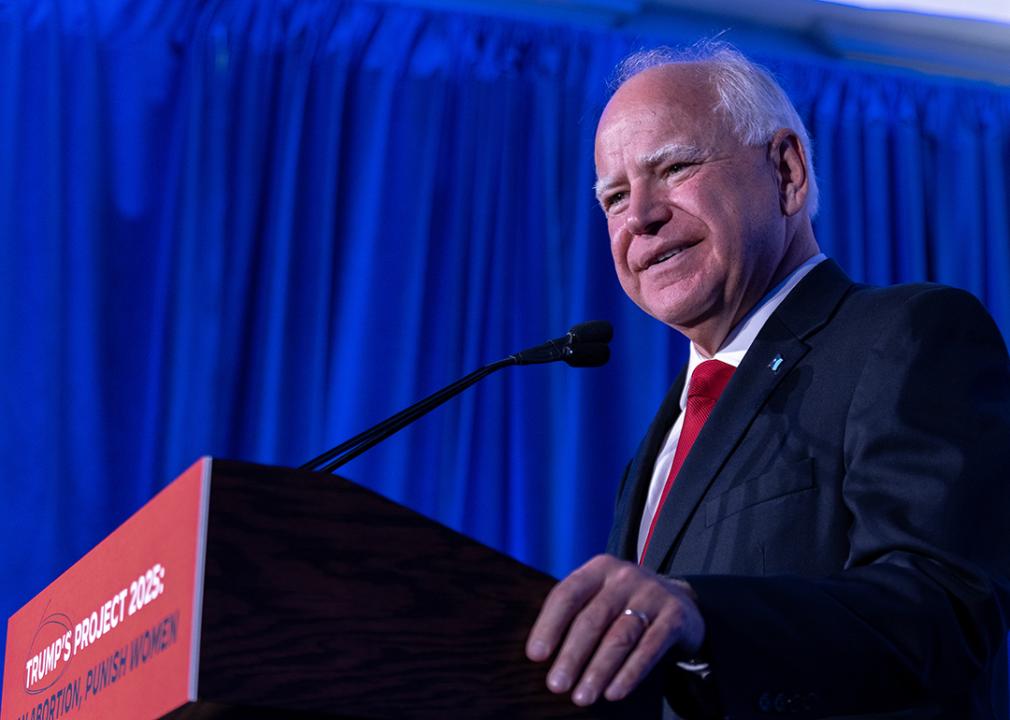Where did Tim Walz go to college?

Jim Vondruska // Getty Images
Where did Tim Walz go to college?
Tim Walz speaks at a Biden-Harris campaign and DNC press conference in Milwaukee, Wisconsin.
As governor of Minnesota, Tim Walz relied on his experience as a former high school teacher and football coach to champion education in his home state. Now, he may have the opportunity to impact education policy from the White House as Democratic presidential nominee Kamala Harris’ running mate.
Harris on Aug. 6 picked Walz, 60, as her choice for vice president, according to The Associated Press.
As BestColleges reports, Walz, who earned a bachelor’s degree from Chadron State College in Chadron, Nebraska, and a master’s degree from Minnesota State University, Mankato, first ran for Congress in 2006 and served as the congressman for Minnesota’s 1st District until 2016 when he announced he would run for governor.
He was elected Minnesota’s 41st governor in 2018 and is currently serving his second term as governor after winning his reelection bid in 2022.
“Minnesotans, let’s recognize some simple truths: Education is the great equalizer of society,” Walz said in his first speech as governor in 2019. “Education unleashes untapped potential. Education conjures the magic of promising beginnings and the grace of second chances.”
Walz Studied to Be a Teacher
Walz was born and raised in rural Nebraska, graduating from Butte High School in 1982 in a class of just 25 students. He enlisted in the Army National Guard straight out of high school and pursued a series of odd jobs before he decided to attend college to study teaching.
In 1989, Walz graduated from Chadron State College with a bachelor’s degree in social science education. Following college, he taught high school in China through a program affiliated with Harvard University, joining one of the first government-sanctioned groups of American educators to teach in Chinese high schools.
Walz has also served as a visiting fellow of international relations at the Macau Polytechnic University, in Macau, China, a position he said has “helped develop his knowledge of China.”
Upon his return to the United States, Walz served full time in the National Guard and organized annual education trips to China for high school students. He began his teaching career as a geography teacher in Alliance, Nebraska, before moving to Mankato, Minnesota, where he taught social studies at Mankato West High School and coached its football team.
In 2001, Walz earned his master’s degree in educational leadership from Minnesota State University, Mankato. He continued to serve in the National Guard until his retirement in 2005 as a command sergeant major.
Walz Invests in Education in Congress, as Governor
During his decade-long career in Congress, Walz signed legislation to increase access to higher education, support students on campus, and make college more affordable.
As governor, Walz has signed an executive order funding alternatives to college and eliminating degree requirements for a majority of state government jobs. He’s also advocated for dual training grants, which provide on-site job training for in-demand industries including advanced manufacturing, healthcare, and the legal cannabis industry.
In 2023, Walz signed the 2024-2025 state budget, which included an additional $650 million for higher education over the next two years. Priorities incorporated in the budget include:
- The North Star Promise Scholarship Program, a new financial aid program covering the cost of tuition and fees at a public institution or tribal college for students whose families make less than $80,000 a year.
- The American Indian Scholars Program, a first-dollar tuition and fee-free pathway for resident students who are members or citizens of a federally recognized tribe or Canadian First Nation and attend a public university in the state.
- The Next Gen Nursing Assistant Initiative, which provides free nursing assistant training to resident students.
The state budget also includes funding for scholarship and fellowship programs for students pursuing careers in paramedicine and addiction medicine, grants supporting underrepresented and rural student teachers, and a tuition freeze for Minnesota State Colleges and Universities for the next two academic years.
![]()
This story was produced by BestColleges and reviewed and distributed by Stacker Media.
